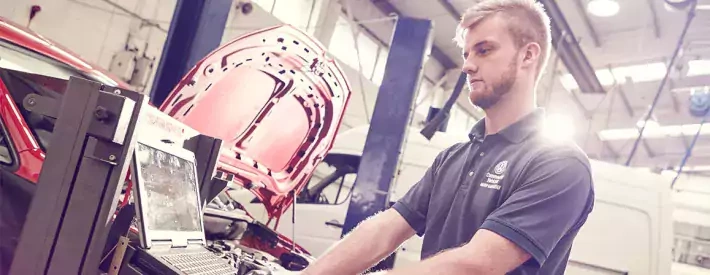The skills you need, for the job you want

In this article: Thinking about a career change, or just taking your first steps in the automotive industry? MotorPro breaks down the skills you’ll need to succeed in a range of roles
Technician
We start with a very broad term for what is really a number of complicated roles, working across a whole range of vehicles. While this has historically been viewed as a fairly straightforward job, let’s face it: it’s not. Here are some of the basic skills that’ll help you get a foot on the ladder, including decent maths, some serious problem-solving skills and strong communication (because when it comes
to tackling the trickier mechanical problems, two heads are definitely better than one).
You’ll need
- Problem-solving skills;
- The ability to use, repair and maintain tools;
- Knowledge of engineering, maths, science and technology;
- Customer service skills;
- Computer know-how on the main software packages; and
- The ability to estimate time and costs for jobs.
MOT Tester
To even consider becoming an MOT tester, you’ll need at least four years’ experience of working as a technician and you’ll need to hold a full UK driving licence for all classes of vehicle that you’ll be testing. There are also some more specific standards that you’ll need to meet, such as proving that you can be trusted to carry out tests on your own.
You’ll need
- Good communication skills for explaining to a customer why their car has failed its MOT and what work it needs;
- A full and current UK driving licence for the vehicle classes you want to test;
- At least four years’ full-time experience servicing and repairing the types of vehicles you’re going to test;
- A pass on the MOT testing course;
- No unspent convictions for criminal offences and to be “of good repute” in the eyes of the DVSA; and
- A level 2 testing certificate for class 4 and 7 vehicles (Group B) and an MOT demonstration test pass, if you want to progress to become a class 3 or 5 MOT tester.
Salesperson
Salespeople get accused of having an easy time of it, but anyone who has ever worked in car sales – or simply had to work with customers all day – knows that just isn’t true. The best salespeople have great manners and are able to listen as well as they can talk. You don’t need any specific qualifications to work in sales, but these skills could be the difference between getting by and earning plenty of commission.
You’ll need
- Strong verbal communication and listening skills;
- Excellent product knowledge;
- Basic maths skills to help you with the financing side, as well as helping you communicate the calculations to customers;
- An understanding of the law and the relevant regulations when selling or financing a car;
- An understanding of car technology and the ability to explain how it works in plain English;
- Leadership skills to motivate others you work with
Independent business owner
It’s not unusual to run your own independent business in the motor trade, but it will require a lot of hard work and mental strength to keep the wheels turning. Having a great team that you can trust will go a long way, and having some of the following skills will get you off to a strong start. You might even choose to top it off with a business management qualification.
You’ll need
- Good communication with employees and customers;
- The ability to work with a team and lead
- An understanding of finances, taxes and profit margins;
- Basic computer skills such as word processing, spreadsheets and emails;
- Problem-solving skills;
- Determination and drive, even in difficult situations.
Fleet operator
This role is something that few people really understand until they have to work with one, and it’s not something people usually discover as a potential career until they’ve left school. Fleet operators manage a large group of vehicles – from cars to lorries – as well as handling drivers and the budgets that pay for them. You don’t need to have a particular technical qualification for this role, but there are courses that you can take at a college or university level that will make you a more attractive candidate. That said, having some of the following skills would be a great starting point.
You’ll need
- The ability to work with numbers and budgets;
- Problem-solving skills;
- Resilience under pressure;
- An understanding of health and safety regulations to protect drivers;
- Writing skills to communicate problems and report your work and
- The ability to multi-task.




